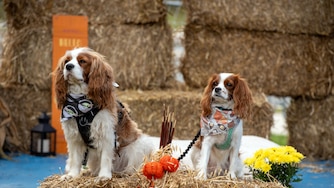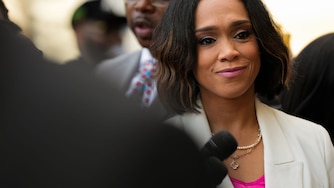Maryland is full of witches.
As someone who has written about witchcraft, occultism and other alternative spiritual practices, I’ve had the chance to meet many of them over the years. (And if you want to know more, I will be doing a presentation on the history of witchcraft Saturday night at the Creative Alliance.)
The Pew Research Center in 2014 estimated that there were 1 million people who identified as pagan or Wiccan in the U.S. And social media is putting the coven in the spotlight. “WitchTok,” the witchy community on TikTok, has 9.2 million posts, and USA Today noted that the #witchtok hashtag had garnered nearly 20 billion views.
We found several Maryland witches willing to come out of the “broom closet” to demystify what they believe, what they do and what they would change about the world if they could.
David Salisbury
Randallstown

Type of practice: Anderson Feri tradition, Hellenic polytheism
Group or solo: All-male queer coven. “It’s like mutual-aid magic.”
Read More
Focus: Relationships with gods, spirits of the land, ancestors. Traditional Hellenic worship.
Origin story: “I was bullied as a little kid, and saw this figure of the witch, like the outsider, loner, but who is also self-reliant, self-sufficient.
“I was 12, and there was this girl in my class who was a witch. She was actually doing the thing and always reading, always researching and practicing. She set me up with some books. I just immediately crushed hard on the craft.”
David Salisbury | Anderson Feri tradition, Hellenic polytheist
When you realized witchcraft worked: “I did a banishment spell on a bully, a really awful, ruthless bully.
“A few days after doing that, I found out that his father had an immediate job relocation and they moved to another state, basically overnight.
“And that’s when I really realized, ‘Oh, this is very real.’ And I should maybe be careful.”
Leaving the broom closet: “I loved being a witch. I would tell anyone who could listen because I was so excited and proud of it.”
Philosophy: “The concept of a healthy relationship with power. Many mainstream religions will say the power of religion is either up top, in the priesthood, the higher echelons of a church, or within a very remote and jealous god. Whereas with witchcraft, the power is within you, it’s within the land, with the spirits and ancestors that you’re working with.”
Fears: “We are entering a new, more modern era of McCarthy-style witch hunting. And I think that’s probably going to get worse before it gets better.”
If you could wave a magic wand and change anything: “Can I say everything? [laughs]. I love people. I believe in people, but we are not seeing the best of people right now.”
Jessica Davis, “Dahlia Moon”
Annapolis

Type of practice: “Eclectic — I pick and choose.”
Group or solo: Primarily solo
Focus: Moon magic, crystals, tarot, protection, journaling. “Hekate is my goddess. I talk to her every day.”
Origin story: “My mom was a Wiccan in the ’90s. ‘Practical Magic’ and ‘Charmed’ were popular when I was in high school. I pulled tarot cards, oracle cards, loved going to psychics, but I wouldn’t have considered myself a witch. My mom was the witch.
“Then COVID happened. The algorithm found me. TikTok kind of brought me into it.
“I did my first Yule ritual, and I was so overwhelmed with joy and excitement and passion. I cried, and I was, like, ‘This is it. I am a witch. I am a powerful witch, and I enjoy doing this.’”
Leaving the broom closet: “I’m still in the broom closet in some circles, but after this election, I was, like, ‘I need to come out there and show people that being a witch is not a dirty word.’”
Philosophy: “We are all energetic creatures. When you add elements, lunar cycles, crystals and herbs, or colors, things that have different correspondences, and you put that all together, along with your word, which is a very powerful tool as well. And deities. All of it works together.
“Magic is not a bad thing. Magic is a beautiful thing.”
Fears: “Women should be embracing their power, especially now. We need women to come together and find joy in their lives, because joy is resistance. But also to fight this terrible threat that is going on in our country right now.”
If you could wave a magic wand and change anything: “That Hillary Clinton got elected in 2016. [laughs] Well, being able to help the planet. Being able to live in a place that treats Mother Earth with the dignity that she deserves.”
Hannah Kincannon
Baltimore

Type of practice: “A witch with an asterisk. Folk magic, specifically from the British Isles. Superstitions, folk healing, home remedies.”
Group or solo: Solo
Focus: ”I’ve been trying my best to cultivate a relationship with the spirit of Baltimore. With the spirit of the land here. It can be as simple as picking up trash.”
Origin story: “I was raised the most generic milquetoast Christian that you can think of and fell into atheism by the time I graduated high school.
“And because the weird shit has always interested me, whether I believe in it or not, I thought, why not just dig a little deeper? I want to see what’s possible.”
When you realized witchcraft worked: “The more I poke the weird, it starts to poke back — the more I allow myself to be open to the possibility of things being a little strange, the stranger things seem to become.
“I’m a believer. A believer with caveats. We should always have caveats.”
Leaving the broom closet: “Not to my family. My family doesn’t know I’m bisexual or an atheist. I’m in multiple closets.” [laughs]
Philosophy: “The question isn’t whether or not it’s real. The question is whether or not it works.
“Fostering a relationship with the living world is the most important goal that I can accomplish doing any of this.”
Fears: “Capitalism. You can go on Amazon and buy yourself a witch kit with a couple of little bottles of crystals and some plastic doohickeys.
“There’s an author that I respect very much who once said, ‘If you can buy it, don’t practice it.’”
Rebecca Funderburk
Towson

Type of practice: Eclectic, “currently a kitchen witch vibe”
Group or solo: Solo
Focus: Simmer pots, floor sweeps and washes, divination (tarot), ancestor and spirit guide work
Rebecca Funderburk | Eclectic, kitchen witch
Origin story: “I just really started doing it. I was a Christian for a long time, then I had a lot of things about Christianity I didn’t enjoy. So I took my time, and just went with what I was interested in. I’ve always listened to my intuition, even as a Christian.”
When you realized witchcraft worked: “The first thing that I realized really worked was divination. People were resonating with my tarot readings. Then I started doing rituals, and the rituals opened my eyes to specifically witchcraft.”
Leaving the broom closet: “I kind of always was out. I just wasn’t practicing it as a lifestyle until more recently. Now I feel more called to sharing information about my daily life.”
Philosophy: “Witchcraft is about your inner power. When we really pursue what calls us, that helps us to evolve.”
If you could wave a magic wand and change anything: “We’ve got billionaires that can really make a true difference. And are not.
“I do think that the scales are tipping — that people who are more interested in making an actual difference, rather than being selfish, are going to begin to have room to do that."
Interviews have been edited for clarity and length.





Comments
Welcome to The Banner's subscriber-only commenting community. Please review our community guidelines.